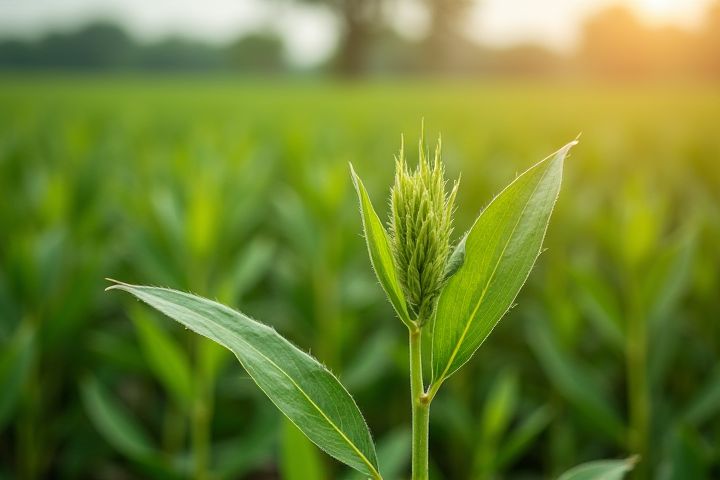
Agriculture development in Nigeria is critical for the nation's economic growth and food security. With over 70% of the population engaged in farming, Nigeria boasts a diverse range of crops, including cassava, maize, yams, and rice, which contribute significantly to both local and export markets. The government has initiated various programs, such as the Anchor Borrowers' Program, to provide financial support and access to modern farming techniques, helping farmers improve productivity. Moreover, the integration of technology in agriculture, like precision farming and drone usage, is transforming traditional practices and enhancing crop yields. With ongoing investments in infrastructure and research, the potential for agricultural innovation and sustainability remains vast, promising a brighter future for Nigeria's agrarian landscape.
Agricultural sector's contribution to GDP
Agricultural development in Nigeria significantly influences the country's GDP, accounting for approximately 21% of the total economic output. This sector not only provides employment for over 70% of the rural population but also plays a vital role in food security and poverty alleviation. Investments in modern farming techniques, irrigation systems, and agricultural technology are essential for enhancing productivity and sustainability. To maximize growth and ensure long-term viability, policies must prioritize infrastructure improvements and access to markets for local farmers.
Decline of subsistence farming
The decline of subsistence farming in Nigeria is a significant concern impacting food security and rural livelihoods. Farmers transitioning to commercial agriculture often face challenges such as inadequate access to financing, poor infrastructure, and limited market opportunities. This shift affects traditional farming practices, leading to reduced crop diversity and reliance on imported food. To combat these issues, initiatives aimed at improving agricultural technology, providing training, and enhancing supply chain logistics are essential for revitalizing the sector and ensuring sustainable development.
Government policy initiatives
Government policy initiatives in Nigeria play a crucial role in advancing agriculture development by promoting sustainable practices and enhancing food security. These policies aim to provide financial support, improve access to modern agricultural technologies, and ensure that smallholder farmers receive the necessary training and resources. By prioritizing infrastructure development, such as irrigation systems and transportation networks, these initiatives strive to increase agricultural productivity and market access. Collaboration between governmental agencies and local communities further strengthens the framework for successful implementation and fosters long-term growth in the sector.
Shift towards mechanized farming
Agriculture development in Nigeria is increasingly characterized by a shift towards mechanized farming, which enhances productivity and efficiency in crop production. This transition incorporates advanced technologies, such as tractors and automated irrigation systems, reducing the reliance on traditional farming techniques. By leveraging these modern methods, farmers can improve yield quality and increase overall output, contributing significantly to food security in the nation. As you explore agricultural opportunities in Nigeria, understanding the benefits of mechanization can play a crucial role in optimizing farm management and sustainability.
Rise of agricultural technology startups
The rise of agricultural technology startups in Nigeria is transforming the agricultural landscape, driving innovation and efficiency. These startups leverage advanced technologies, such as precision farming, drones, and data analytics, to optimize crop yield and reduce waste. By addressing challenges such as food security and sustainability, these enterprises foster economic growth and empower local farmers through enhanced access to resources and knowledge. Your involvement in this sector could contribute to the ongoing evolution of agriculture, ultimately benefiting the nation's economy and food supply.
Development of irrigation infrastructure
The development of irrigation infrastructure in Nigeria aims to enhance agricultural productivity and ensure food security. By establishing efficient irrigation systems, farmers benefit from reliable water sources, reducing their dependence on unpredictable rainfall patterns. Improved irrigation not only increases crop yields but also enables the cultivation of a wider variety of crops throughout the year. As a result, modernized irrigation initiatives contribute significantly to rural economic growth and sustainable development in Nigeria's agriculture sector.
Impact of climate change
Agricultural development in Nigeria is increasingly influenced by the impacts of climate change, which alters rainfall patterns and affects soil fertility. Farmers face challenges such as droughts, flooding, and increased pest infestations, directly impacting crop yields and food security. To adapt, innovative practices such as climate-smart agriculture and sustainable land management are gaining traction among rural communities. Investing in research, technology, and education can empower farmers to mitigate these climate risks and enhance resilience within Nigeria's agricultural sector.
Growth in export-oriented agriculture
Nigeria's agricultural development strategy emphasizes export-oriented agriculture, aiming to increase the nation's competitiveness in global markets. This approach prioritizes the cultivation of high-demand cash crops such as cocoa, palm oil, and groundnuts, which can boost foreign exchange earnings. Implementing modern farming techniques and improving access to finance and technology are essential for enhancing productivity and sustainability. By fostering partnerships between farmers and agribusinesses, the Nigerian government seeks to create a robust agricultural sector that contributes significantly to economic growth.
Importance of agricultural extension services
Agricultural extension services in Nigeria play a critical role in enhancing the productivity and sustainability of the farming sector. These services provide essential training and information to farmers, empowering them with modern techniques, best practices, and access to new technologies. By facilitating connections between researchers and farmers, agricultural extension contributes to the adoption of innovative strategies that improve crop yields and food security. Investing in these services not only boosts rural economies but also addresses challenges such as climate change and resource management, directly impacting your agricultural success and livelihood.
Land use and tenure reforms
Agricultural development in Nigeria emphasizes the importance of land use and tenure reforms to enhance productivity and food security. Effective land tenure systems can empower farmers by providing them with secure access to land, encouraging investment in sustainable farming practices. Implementing innovative land-use policies can help optimize resource allocation, leading to increased crop yields and improved livelihoods. By addressing land-related challenges, Nigeria can pave the way for a more resilient agricultural sector that supports economic growth and community development.
